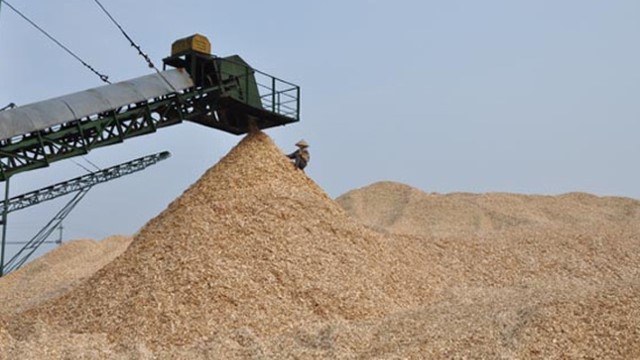
Beginning in 2011, our country has set a record export paper with the amount of exports up to 5.4 million tons. However, the export of pulp raw materials to the international market also caused some problems for paper companies and wood processing in Vietnam.
Exports of eucalyptus and hybrid acacia have increased more than 10 times in the last decade. In 2001, the country exported only 400,000 tons of wood chips but by 2011, it had increased by 5 million tons compared with the beginning. Exports in 2011 were 36% higher than 2010 and tripled since 2007 due to rising demand for pulp production in recent years.
Australia is the largest wood chip supplier in the world for nearly 20 years, but having lost its position to Vietnam with shipments accounting for around 20 percent of global pulp and paper sales in 2011.
According to experts, the expansion of pulp capacity in China has led to a sharp increase in the number of hardwood plantations and chipmaking facilities in Vietnam. This material is mainly exported through the Hai Phong port area and along the central ports. At many ports in central of Vietnam such as Ky Ha (Quang Nam), Dung Quat (Quang Ngai), Chan May (Thua Thien Hue), there are regular bulk carriers. The export markets are Korea, Japan and China. With limited domestic supply, China will continue to rely on neighboring countries to provide pulp production in the future.
Representatives of Dak Lak agroforestry farmers said that due to the lack of capital, they had to exploit timber trees early to cut sawn timber for export instead of planting several years for higher value sawn timber. One ton of wood in the market costs 500,000 VND, while one ton of sawn timber costs four times as much. The massive export of wood chips does not only affect the demand for wood materials and pulp materials in the future, but also affects the wood processing and paper industries.
With the paper industry, wood chips are a kind of raw material, much lower value if the direction of export paper and pulp. According to Vu Ngoc Bao, general secretary of the Vietnam Pulp and Paper Association, paper mills in the country are importing raw materials at prices 9-10 times higher than the price of pulp. While the export price of wood chips in Vietnam to China and Japan is only about USD110-120 per ton, the price of imported pulp is at an average of USD900-1000 per ton. This is a clear example of the situation "export crude", which the paper industry has spoken for decades.
Despite the huge amount of wood chips exported, the value of the annual turnover is only about $ 300 million and the amount spent to import pulp amount to $ 700 million per year.
Recently, An Hoa Paper Joint Stock Company (An Hoa Paper) has proposed to increase the export tax on sliced pieces to 20% instead of 5% as now, creating conditions for production of pulp in the country with raw materials. Mr. Bao – leader of Paper & Pulp association said that the given reasons of An Hoa Paper is reasonable, domestic pulp producers can buy domestic wood materials for production.
Due to the high volume of raw materials for pulp production, the prices of these raw materials have increased dramatically. The government should have planning for clusters of raw material and processing areas to make use of wood chips and sawn wood in sawmilling to produce much higher value flooring than raw material exports.
However, forestry companies and forest planters are opposed to the paper industry and wood processing. Binh Dinh FPA Company has written a petition to "not approve the proposal to limit the export of wood chips" to the Ministry of Industry and Trade, Ministry of Agriculture and Rural Development, General Department of Forestry, Wood Association and Vietnam Forest Products.
According to this document, limiting the export of wood chips will cause sudden difficulties for enterprises producing wood chips from planted forests, causing damage to people, afforestation units and reducing incentives forest development. Currently, the purchase of timber from planted forests of households and enterprises in the forest is not much, mainly through the production of wood chips and artificial boards.
On the other hand, the proposed imposition of export quotas on wood chips is unreasonable. The taxation will directly affect and damage the people, the plantation units throughout the country. Thanks to the high selling price of timber, people and afforestation units keep the forest, generate income for new forest plantations and have access to, develop forest certification and sustainable forest management.
Apparently, the tax rate of 5% is higher than that of the Ministry of Industry and Trade. However, a specialist in the Light Industry Department (Ministry of Industry and Trade) said that it is necessary to calculate the tax rate to balance the interests of the growers. Excess production of pulp and wood industry.
To find out more about domestic and international paper markets, visit the International Exhibition & Conference on Paper and Pulp industry in Vietnam at the Saigon Exhibition and Convention Center (SECC) from 26 - June 28, 2019.
Source: VPPA

